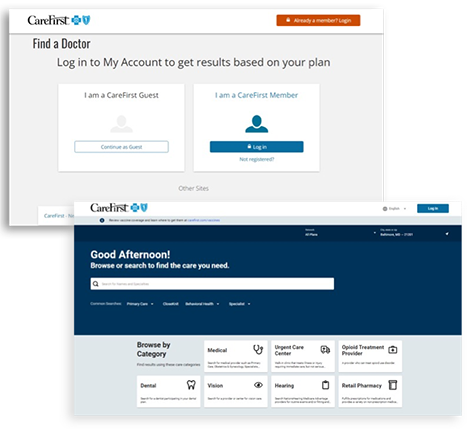What Is a Primary Care Provider?
A primary care provider (PCP) is sometimes called a primary care physician. A PCP can be:
- a doctor,
- nurse practitioner, or
- physician assistant
How Do I Choose a PCP if I Don't Have One?
There are three reliable ways to start your search:
- Talk to your friends and family—personal recommendations can give you a good sense of whether you would be comfortable with a particular PCP.
- Use a health insurance company's provider directory—this is typically an online tool that helps you find a PCP in your area and within your health plan's network, such as CareFirst's Find a Doctor tool.
- Sign up for Virtual-First Primary Care—with CloseKnit, get the care you need when you need it from your desktop or mobile device.

You will see a list of PCPs who are in network for CareFirst coverage. You'll also see:
- PCP’s specialty (internal medicine, family practice, nurse practitioner, pediatrics)
- whether they're accepting new patients,
- what languages they speak,
- where they went to medical school, and
- their practice address and phone number.
Note: If you logged in as a CareFirst member, you would only get results for doctors that accept your particular CareFirst plan.
Do I Have To Choose a PCP?
If you have an HMO health plan, you will usually be required to choose a PCP. You may also need a referral (written notice) from your PCP to see any medical specialists other than an OB/GYN.
Otherwise, when it comes to receiving care, you have a choice:
- You can receive care from any doctor you would like to see. (However, using in-network doctors will often reduce the amount you pay for care.)
- Selecting a PCP is not mandatory—but it is highly recommended.
Why Is Choosing a PCP Important?
Establishing a relationship with a PCP is the best way to receive consistent, quality care and ensure your healthcare experience is the best it can be. They play a huge role in keeping you healthy now and in the long run.
Your PCP's office is your medical "home base." They lead a team of people who care about your unique needs and health goals. Your PCP:
- Has online access to your medical records from all your doctors, including labs results and prescriptions
- Ensures you get the care you need, when you need it
- Reviews all your medications for any possible drug interactions or duplications
- Develops a personalized plan of care for any health problems
Your PCP also helps you coordinate additional care you may need among other providers, such as a visit with a specialist, X-rays or lab work.